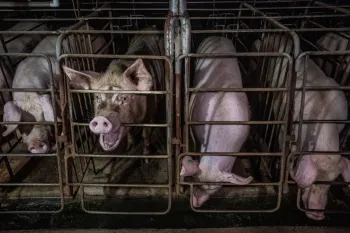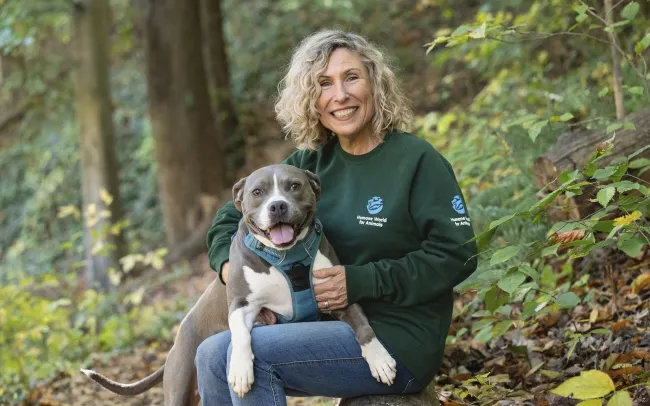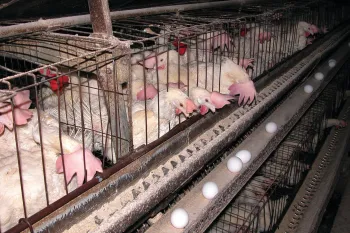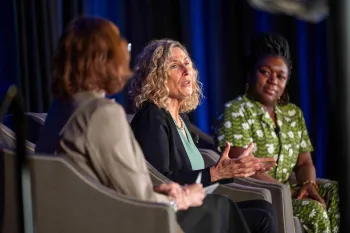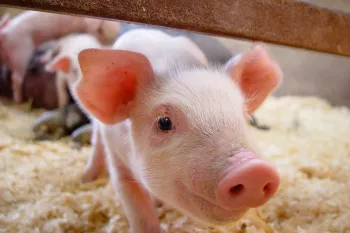Each year, more than 94.9 billion terrestrial animals are kept and killed for food. Behind this staggering number lies a global system of industrial animal agriculture—one that is often devastatingly cruel and environmentally destructive. This is also a system that is capital-intensive, meaning there is money involved—a lot of money.
Financial institutions, both public and private, are pivotal actors in this system. Their decisions shape which production models thrive, which innovations are scaled, and ultimately, what kind of food system is passed on to future generations. It is therefore immensely important that considerations of animal welfare and a shift toward plant-forward food systems are integrated into core financing and investing strategies.
That’s why we at Humane World for Animals work with financial institutions to integrate higher animal welfare and plant-forward strategies into their core funding policies and practices. Our goals are clear: Improve the lives of animals currently in production and stem the growth in the number of animals kept and killed for food.
It was in this spirit that members of our staff recently joined a panel discussion at the World Bank Spring Meetings. While we don’t always agree with the positions of the World Bank or the International Financial Corporation, we value continued engagement and the opportunity to help shape a more humane and sustainable future. The panel was called How Can IFC Support the Shift to Sustainable Food Systems, and it was a timely and important conversation.
During the panel, IFC’s head of global agribusiness outlined several animal production practices the institution no longer finances, such as confining hens in the egg industry to battery cages and confining pregnant pigs in gestation crates for their entire pregnancy. (Under common industry practice mother pigs kept for breeding in the pork industry spend the majority of their lives confined to crates so small they are unable to turn around.) These exclusions, while not comprehensive, go further than many other financial institutions, over 100 of which reference IFC’s Environmental and Social Performance Standards in their own frameworks, which guide risk and impact assessments.
Yet, referencing IFC standards is not the same as implementing them. Many major financial players, such as Citigroup, Bank of America, Barclays, JP Morgan Chase, HSBC, Santander and Credit Suisse, among others still lack any public-facing commitments to animal welfare. As of March 2023, private financial institutions held more than $323.3 billion in assets in the world’s largest animal production companies—financing and investments likely made without meaningful consideration of farm animal welfare or the many other harms of industrial animal agriculture.
Recent shareholder resolutions at Bank of America and Citigroup asked these institutions to disclose how they manage material risks related to poor animal welfare. Both boards opposed the proposals and signaled no intention to address the issue publicly. That’s not just disappointing, it’s dangerous.
And it is not just commercial banks that are putting their funds at risk. A recent incident involving Daybreak Foods in South Africa, for instance, highlights the financial and reputational risks of supporting industrial animal agriculture operations. After reportedly running out of funds, the company left over 350,000 birds to starve. Daybreak is owned by the Public Investment Corporation, which manages assets for the Government Employees Pension Fund—one of Africa’s largest. Like many other financial institutions, PIC doesn’t have a public-facing animal welfare policy. The case reflects a broader concern: mass killing events, or “depopulation,” are common across industrial animal farming, underscoring the link between financial support and systemic welfare issues.
Poor animal welfare is clearly a moral issue, and it’s also bad for business. As a material risk-and-return consideration, bad practices relating to animals can impact a company’s success and profitability. From shifting consumer preferences and regulatory changes to supply chain volatility and reputational damage, the costs of inaction are mounting. Strong animal welfare practices also align with global sustainability guidelines and standards such as the OECD Guidelines for Multinational Enterprises, as well as sector standards from the Sustainability Accounting Standards Board and the Global Reporting Initiative.
The bigger picture
Industrial animal agriculture is a leading driver of biodiversity loss, pollution, climate change and public health risks. It also displaces small-scale farmers and undermines food security. At the World Bank Spring Meetings, the IFC reiterated its support for large-scale agriculture, citing under-consumption of meat in emerging markets as a cause of malnutrition. But we already produce enough food to feed the world. Food security is about more than yield and availability—it also includes access, utilization and stability.
Efficiency alone won’t save us, and science-based, practical solutions exist that can sustainably feed a growing population without relying on large-scale industrial animal agriculture. We can feed the world without destroying the planet and supporting cruelty.
A path forward
Financial institutions have a choice. They can continue to fund systems that harm animals, people and the planet, or they can lead the transition to a more humane and sustainable future. That means incentivizing higher-welfare systems, disincentivizing harmful ones, and shifting capital toward plant-forward food systems.
Financial institutions must do more. They must move beyond symbolic references and integrate animal welfare into their due diligence process, investment agreements and active engagement strategies. They must recognize and reject humane washing. They must meet the growing demand for more ethical and environmentally friendly food options, because stronger welfare practices and plant-forward strategies are not only ethically sound—they’re essential to building resilient, future-proof food systems.
We at Humane World for Animals are here to forge this path. We are working with financial institutions conducting training and knowledge sharing on higher welfare practices, providing opportunities to meet with producers and corporate buyers, and offering resources through the Farm Animal Responsible Minimum Standards Initiative (FARMS Initiative) coalition. We will continue to engage in the IFC’s sustainability framework consultation to advocate for stronger animal welfare standards. Because a more humane and sustainable food system cannot come soon enough.
